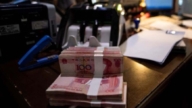【新唐人2012年2月28日讯】近来,中国四大龙头房地产企业带头掀起的楼市降价风潮,正在中国蔓延,很多房地产企业纷纷跟进。市场人士预计,更大规模的促销会在3月份展开,这是自去年10月底以来中国楼市的第二波降价潮。北京经济学家茅于轼认为,房价下降50%都不过分。
在北京当局楼市调控政策的重压下,2月份国家统计局发布的数据显示,1月份中国70个大中城市新建商品住宅价格全面停涨,其中,降价的城市有48个,持平的城市有22个。
1月份,中国大部分城市的土地成交量明显下跌,地价节节滑落。大型房企的销售大幅下滑,16家标杆房企1月份销售总额不足300亿元,不及去年同期的一半。
标普、瑞银国际等金融机构近期纷纷预警,2012年中国房地产信贷大量到期,由于销售回款不力和短期债务压力,2012年部分房企可能面临现金流危机。
近期,保利集团在上海新推出200多套房,单价从每平方米1.9万元降到1.7万元。保利在中国40多个城市联合促销,共涉及2万套房源。
随后,另一家龙头企业“招商地产”22个在售项目同时启动优惠活动,部分房源降价达到15%。此外,许多大型房地产企业也纷纷跟进。目前,形式多样的促销战正在北京、上海、深圳等地楼市上演。
经济学家茅于轼日前指出,中国经济今明两年最大的风险就是房地产泡沫破灭,因为空房太多了。
什么叫房地产泡沫破灭呢?茅于轼表示,就是房价不断往下落,他估计房价不止掉30%,差不多掉50%。三年前,北京的房价就掉了这么多。因此他不鼓励老百姓现在出手买房。
茅于轼:“房地产泡沫的背后是几个原因,最主要的原因就是投资渠道不畅,有钱人手里的钱没有地方去,就去买房子,如果有好的投资机会,他们就不会买房了。其次,我们的收入差距太大,有钱的人买好多的房,没钱的人一个房也买不起。另外,我们的土地供给不足,土地为什么贵呀?国家垄断了土地。”
自从中共当局实施限购政策以来,北京、上海、杭州、重庆、武汉、合肥、南京等17个城市出台了不同的微调政策,其中,芜湖、佛山、成都等因为微调幅度过大,政策颁布不久就被中央“叫停”。
最近,温家宝和李克强强调,要坚持房地产调控不动摇。经济学家綦彦臣表示,以固定资产泡沫带动增长,中国经济已经付出了昂贵的代价,房地产泡沫破裂对发展实体经济是有益的。
綦彦臣:“降幅至少有60%,才可能出现一种什么样的市场呢?真正的房地产住房消费,也就是说,你买了房子就是为了一家人住,而不是投资或者投机。政府你千千万万不能从房地产上贪钱,土地出让金占了地方财政收入的40%以上,这是为什么呢?就是我们的政府养闲人太多。”
经济学家谢国忠最近也表示,房地产泡沫的破裂,会限制地方政府最大的资金来源,浪费型的项目将会终止,由此将会导致增长放缓和经济效率提高。房价下跌的过程,将会让财富从政府转向居民。
新唐人记者周玉林、李元翰、李若琳采访报导。
China’ House Prices Down By 50%, Experts Say
Recently, China’s four major real estate companies
have taken the lead of lowering prices in the house market.
Many other real estate companies
are following them closely.
Market experts foresee that more large-scale promotion
will commence in March.
This will be the second price reduction
since the end of last October in China.
Beijing-based economist Mao Yushi said, it will not be
an overstatement to say that house prices are falling by 50%.
China’s house market is under a big pressure
of regulation policy from Beijing authorities.
Released by National Bureau of Statistics data in February,
shows the latest trend.
These data shows that the price of new commercial houses
in 70 large and medium-sized cities stopped rising in January.
Among them were 48 cities with price reduction,
and 22 cities holding the line.
In January, the land turnover decreased significantly
in most of China’s cities, and the land price fell steadily.
The sales of large-scale housing companies fell sharply.
The total sales of 16 benchmark housing companies were
under RMB 30 billion, less than half of that last January.
Standard & Poor’s, UBS and other world financial institutions
have warned, many Chinese housing loans are due in 2012.
As a result of weak sales and short-term debt pressure,
some house companies will face a cash flow crisis in 2012.
Recently, Poly Group released 200 flats in Shanghai,
with price fall from RMB 19,000 to 17,000 per square meter.
Poly Group carried out a co-promotion
in over 40 cities in China, with 20,000 flats involved.
Another leading house company, ZhaoShang DiChan,
launched promotions for its 22 on-sale projects, and the price fall of some houses is up to 15%.
In addition, many other large house companies
also follow this pattern one after another.
Now various forms of promotional campaigns are carried out
by Beijing, Shanghai, Shenzhen and other house markets.
Economist Mao Yushi recently pointed out some risks
with China’s economy.
The biggest risk of this and next’ year is the house market’
bubble burst, as there are too many empty houses, thinks Mao.
What would a bubble burst of the house market mean?
Mao Yushi said this is the continual fall of the house prices.
He estimated that house prices will fall
between 30% and 50%.
Three years ago, the house price in Beijing fell that much.
So he does not encourage people to buy houses now.
Mao Yushi: “There are several reasons
behind the house market’ bubble.
The main reason is poor investment channels.
Rich people have no place to invest, and go to buy houses.
If there are good investment opportunities,
they would not buy houses.
Secondly, the income gap is too large. Rich people buy
a lot of houses, but poor people can not afford even one.
In addition, the land supply is insufficient. Why is the land
so expensive? Because the state monopolizes it."
The Chinese communist authorities implemented the policy
of house purchase restriction nationwide.
However, different regulation policies were issued in 17 cities,
including Beijing, Shanghai, Hangzhou, Chongqing, etc.
And some cities, like Wuhu, Foshan and Chengdu
had changed the policy too much.
Thus they were called by the central government to stop,
soon after issuing their policies.
Recently, Wen Jiabao and Li Keqiang stressed,
that the house market regulation policy shouldn’t be changed.
Economist Qi Yanchen said, with the fixed asset
bubbles-led growth, China’s economy has paid a high price.
And that the house bubble burst will be beneficial
to the development of the real economy.
Qi Yanchen: “The decline is at least 60%,
what kind of a market could this be?
The real housing consumption’ purpose is to buy a house for
your family to live, rather than for investment or speculation.
The government should not be greedy for money
from the housing market.
The land transfer payments account
for more than 40% of the local fiscal revenue.
Why? Because there are too many idlers
in our government."
Economist Xie Guozhong also said, the house bubble burst
will limit local governments’ largest source of funding.
The wasteful projects will be terminated.
This will lead to slower growth and economic efficiency.
The process of house price falling will make the wealth shift
from the government to the citizens.
NTD reporters Zhou Yulin, Li Yuanhan and Li Ruolin






























